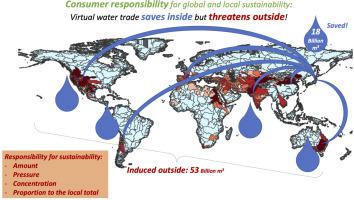Resources, Conservation and Recycling ( IF 11.2 ) Pub Date : 2023-05-22 , DOI: 10.1016/j.resconrec.2023.107055 Masaharu Motoshita , Stephan Pfister , Takahiro Sasaki , Keisuke Nansai , Seiji Hashimoto , Ryosuke Yokoi , Kamrul Islam , Matthias Finkbeiner

|
Freshwater, a limited natural resource, is unevenly distributed worldwide; this limited availability necessitates the virtual water trade in global supply chains, which may induce freshwater overconsumption (beyond carrying capacities). The dependency on remote water resources is imperceptible and barely recognized by consumers indirectly inducing water consumption. Here, we highlight the significance of remotely induced water consumption through supply chains and considerations for assessing and managing the sustainability of water resources through a case study of the Japanese national water footprint. The blue water consumption induced by the Japanese final demand (53.2 Billion m3) is approximately three times the volume saved through virtual water trade. For the compatible achievement of global and local sustainability of freshwater use, the hotspots in the global supply chains must be identified by considering three additional aspects in parallel, i.e., the concentration of overconsumption, pressure of overconsumption, and proportion to the local total overconsumption amount.
中文翻译:

全球供应链中可持续用水的责任
淡水是一种有限的自然资源,在世界范围内分布不均;这种有限的可用性使得全球供应链中的虚拟水贸易成为必要,这可能会导致淡水过度消耗(超出承载能力)。消费者对偏远水资源的依赖是潜移默化的,几乎不为消费者所认识,间接导致用水量增加。在这里,我们通过日本国家水足迹的案例研究强调了通过供应链远程诱导水消耗的重要性以及评估和管理水资源可持续性的考虑因素。日本最终需求引起的蓝水消耗量(532 亿立方米) 大约是通过虚拟水贸易节省的体积的三倍。为了协调实现全球和地方淡水利用的可持续性,必须通过并行考虑三个额外方面来确定全球供应链中的热点,即过度消费的集中度、过度消费的压力和占当地总过度消费量的比例.







































 京公网安备 11010802027423号
京公网安备 11010802027423号